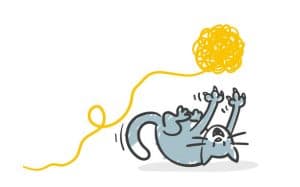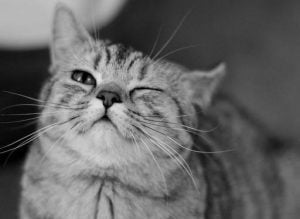Caring for Your Aging Cat: Understanding Behaviour Changes in Senior Felines
As our feline companions age, they go through various physical and behavioural changes. It is essential for cat owners to understand and address these changes to ensure the well-being and happiness of their older cats. Here, we will delve into the common behaviour changes seen in elderly cats and discuss ways to manage them.
The Challenges of an Aging Cat
What are the common behaviour changes in elderly cats?
An older cat may experience several behavioural changes as they age. These changes can range from increased sleeping and decreased activity levels to changes in eating patterns and even litter box issues.
How does a cat’s behaviour change with age?
As a cat gets older, their behaviour gradually changes. They might become less active, more withdrawn, or exhibit signs of anxiety. Additionally, older cats may develop new behaviours such as excessive vocalization or increased aggression.
What are the behavioural changes seen in senior cats?
Senior cats often display changes in their behaviour, such as increased irritability, reduced interest in interactive play, and a preference for a more sedentary lifestyle. They may also become more clingy or develop separation anxiety.
How do behaviour problems in older cats differ from younger ones?
The behaviour problems seen in older cats may differ from those observed in younger cats. While behavioural issues in younger cats may be related to playfulness or curiosity, older cats may exhibit problems such as aggression, excessive vocalization or issues related to cognitive decline.
What are the needs of an aging cat?
An aging cat has specific needs that require attention and care. Regular veterinary check-ups, a balanced diet, and mental stimulation are vital for their well-being. Providing a comfortable environment and monitoring their behaviour for any changes are also crucial.
Understanding the Impact of Aging on Behaviour
How does feline behaviour change as cats get older?
Feline behaviour changes as cats get older due to various factors. Physical discomfort, age-related health issues, and changes in brain function can result in altered behaviour patterns. It is important for owners to understand and address these changes to ensure their cats’ quality of life.
What role does kidney disease play in behaviour changes?
Kidney disease is a common health issue in older cats and can contribute to behaviour changes. Cats with kidney disease may exhibit increased thirst, frequent urination, weight loss, and changes in eating habits, which can all impact their behaviour and mood.
How can owners help their older cats with behaviour changes?
Owners can help their older cats cope with behaviour changes by providing a calm and predictable environment. They can also ensure that their cats have access to comfortable resting areas, engaging toys, and proper nutrition. Maintaining a regular routine and seeking veterinary guidance are important steps in addressing behaviour changes.
What are the behavioural changes associated with age-related cognitive decline?
Age-related cognitive decline in cats can lead to several behavioural changes. Cats may become disoriented, forgetful, or experience changes in their sleep-wake cycle. They may also exhibit signs of confusion or appear less responsive to their environment.
What can be done to manage behavior problems in older cats?
To manage behaviour problems in older cats, it is essential to identify the underlying cause. This may involve medical intervention, such as treating any underlying health issues, medication to manage pain or anxiety, and implementing behavioural modifications. Professional guidance from a veterinarian or animal behaviourist may be helpful in developing an individualized plan.
Practical Tips for Caring for an Aging Cat
How can you make your elderly cat feel more comfortable at home?
There are several ways to make your elderly cat feel more comfortable at home. Providing soft bedding, cozy hiding spots, and easy access to food and water will help meet their physical needs. Moreover, maintaining a warm and peaceful environment can reduce stress and promote their overall well-being.
What changes in behaviour should prompt a visit to the veterinarian?
If your senior cat exhibits changes in behaviour, such as sudden aggression, loss of appetite, excessive drinking or urination, or changes in litter box habits, it is essential to consult a veterinarian. These changes may indicate underlying health issues that require medical attention.
What are some strategies for maintaining a healthy and stimulating environment for senior cats?
Maintaining a healthy and stimulating environment for senior cats involves providing them with opportunities for mental and physical stimulation. Interactive toys, puzzle feeders, and gentle play sessions can keep their minds engaged. Additionally, regular exercise and climbing structures can help senior cats maintain their agility and flexibility.
How can you address common behaviour problems in older cats?
Addressing common behaviour problems in older cats requires understanding the root cause. Consulting with a veterinarian or animal behaviourist can help pinpoint the issue and develop a tailored plan. This may include behaviour modification techniques, environmental adjustments, or medication if necessary.
What are the benefits of providing outdoor access through cat flaps?
Providing outdoor access to senior cats through cat flaps allows them to engage with their natural instincts and explore the environment. It can provide mental stimulation and physical exercise, contributing to their overall well-being. However, it is crucial to consider the potential risks associated with outdoor access and ensure their safety.
The Importance of Veterinary Care for Senior Cats
Why is regular veterinary care crucial for older cats?
Regular veterinary care is crucial for older cats as it allows for early detection and management of health issues. Senior cats are more susceptible to age-related conditions, and routine check-ups help identify any signs of illness, monitor chronic conditions, and ensure appropriate preventive care.
What types of age-related health issues may contribute to behaviour changes?
Several age-related health issues can contribute to behaviour changes in older cats. These include arthritis, dental problems, vision or hearing loss, hyperthyroidism, and cognitive decline. Treating these underlying conditions can improve the cat’s overall well-being and minimize behavioural issues.
How can a veterinarian help manage behaviour problems in senior cats?
A veterinarian can play a crucial role in managing behaviour problems in senior cats. They can evaluate the cat’s overall health, rule out any underlying medical conditions, and recommend appropriate behavioural interventions. In some cases, medication may be prescribed to help manage anxiety or pain-related behaviours.
What are some preventive measures to ensure the overall well-being of aging cats?
To ensure the overall well-being of aging cats, preventive measures such as regular vaccinations, parasite control, and dental care should be implemented. Additionally, providing a balanced diet, maintaining a healthy weight, and promoting mental and physical exercise are essential for their long-term health.
How does the cat population benefit from addressing behaviour and health in older cats?
By addressing behaviour and health in older cats, we contribute to the overall welfare of the cat population. This includes reducing the risk of neglected medical conditions, preventing the onset of behaviour problems, and promoting a better quality of life for aging cats.
Keeping Your Aging Cat Happy and Comfortable
What can you do to make your older cat’s life more enjoyable?
To make your older cat’s life more enjoyable, provide them with plenty of love, attention, and gentle playtime. Create a safe and comfortable environment with cozy beds, scratching posts, and interactive toys. Offering a variety of tasty treats and providing mental stimulation can also keep their spirits high.
How does grooming and dental care play a role in an aging cat’s behaviour?
Grooming and dental care play a crucial role in an aging cat’s behaviour. Regular brushing helps maintain their coat health and reduces discomfort from matting or skin issues. Dental care, such as regular teeth brushing, prevents dental disease and associated pain, ensuring they can eat comfortably and enjoy their food.
What are some behavioural changes that indicate pain or discomfort in older cats?
Behavioural changes that indicate pain or discomfort in older cats may include increased aggression, reluctance to be touched, changes in eating or drinking habits, excessive grooming, or hiding more than usual. These changes may indicate the need for medical attention and pain management.
How can you provide mental stimulation for your senior cat?
To provide mental stimulation for your senior cat, offer them puzzle toys, treat-dispensing toys, or interactive play sessions. Introducing new toys or hiding treats in different areas of the house can keep their minds engaged and prevent boredom.
Why is it important to make adjustments as your cat ages?
It is important to make adjustments as your cat ages to meet their changing needs. Adapting their environment, diet, and exercise routine helps ensure their comfort and well-being. Regular monitoring of their behaviour and health allows for early intervention and appropriate care as they transition into their senior years.
Conclusion
The senior years of our cats demand more responsibility and care, but they also offer precious opportunities for deeper connections. By learning how to navigate these years wisely and practicing proper caregiving techniques, we can ensure that our cats enjoy their golden years to the fullest. Our small efforts can make a significant impact on our cats’ happiness and well-being.





